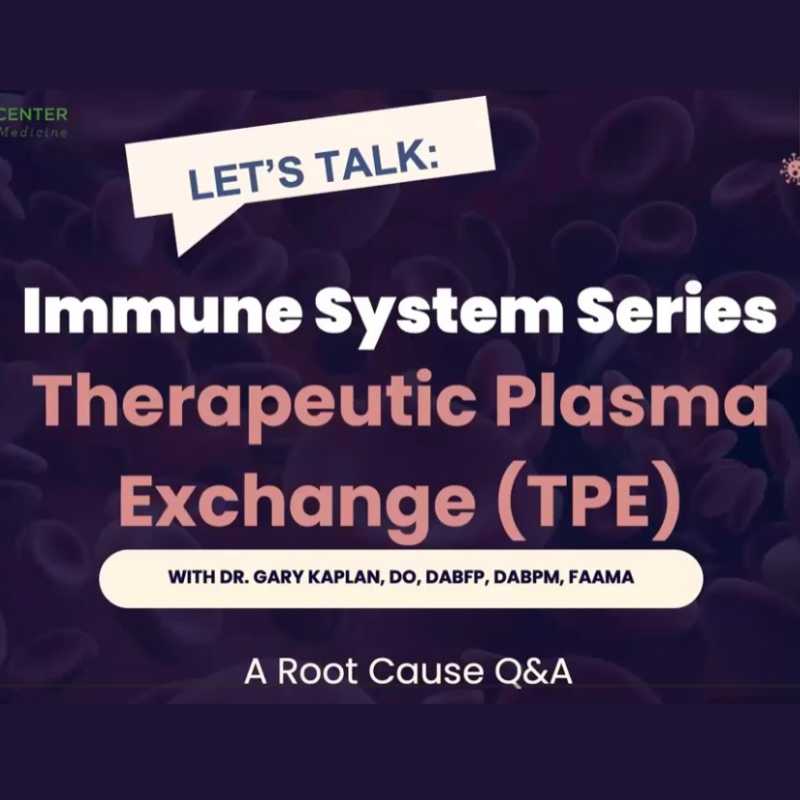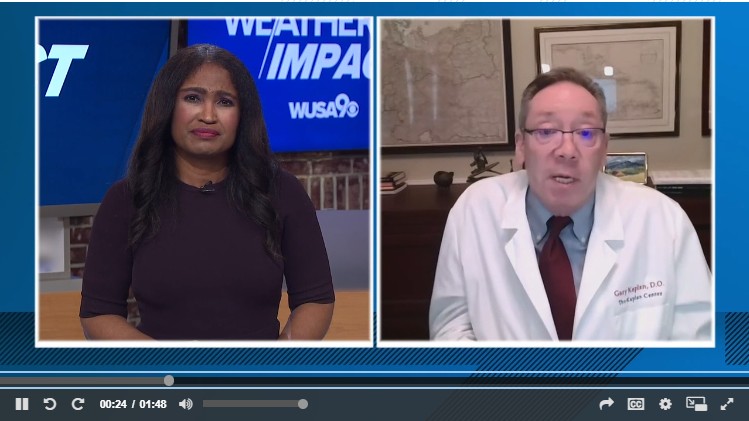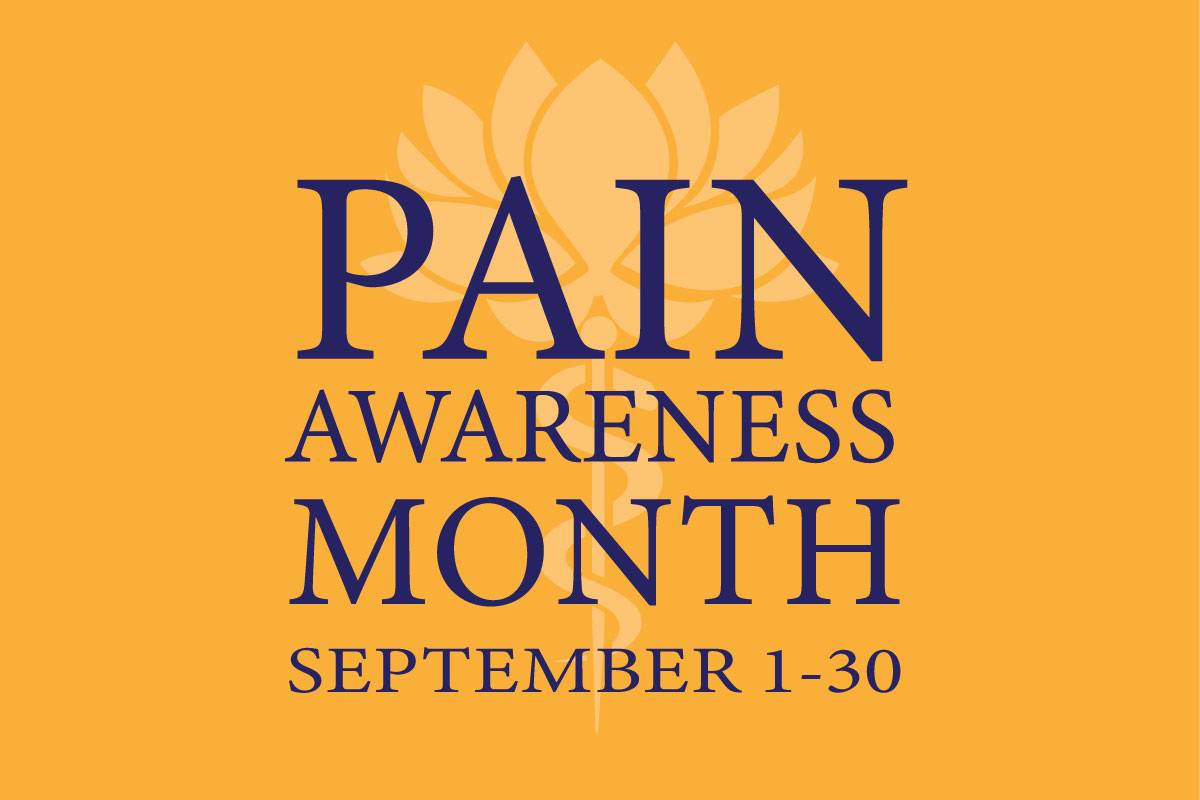
5 Ways We Can Keep Your Immune System Strong
December 10, 2025/by Kaplan Center
Want to Take Your Workout to the Next Level Next Year? These Tips Can Help
December 8, 2025/by Kaplan Center
Dr. Kaplan’s Dos and Don’ts of the Holiday Season
December 3, 2025/by Kaplan Center
Let’s Talk Webinar – A Root Cause Q&A
December 2, 2025/by Kaplan Center
Navigating Holiday Meals with Gut Issues: Simple Tips for a Comfortable Season
December 1, 2025/by Chardonée Donald, MS, CBHS, CHN, CNS, LDN
Craniosacral Therapy for TMJ | Say Goodbye to the Daily Grind
November 19, 2025/by Patricia Alomar, M.S., P.T.
From Compassionate Care to Personal Healing: A Letter to My Patients
November 18, 2025/by Kaplan Center
8 Steps to a Healthier Gut—and a Longer, Healthier Life
November 18, 2025/by Kaplan Center
Mid-Life Irritability & Fatigue Improved by Hormonal Balancing
November 13, 2025/by Lisa Lilienfield, MD
From Challenges to Change: Dr. Kaplan on Healthcare’s Biggest Challenges
October 29, 2025/by Kaplan Center
Overlooked Dangers of Mold Exposure and How to Stay Safe – Dr. Kaplan Talks to WUSA9
October 27, 2025/by Kaplan Center
Let’s ‘Fall’ Into Wellness: A Nutritionist-Approved Immune-Boosting Recipe for Cold and Flu Season
October 13, 2025/by Chardonée Donald, MS, CBHS, CHN, CNS, LDN
PANS/PANDAS – When Sudden Symptoms Signal Something More
October 9, 2025/by Kaplan Center
Beating Burnout, A Nutritionist’s Perspective
October 1, 2025/by Chardonée Donald, MS, CBHS, CHN, CNS, LDN
3 Things That Can Happen After Stopping GLP-1s
September 11, 2025/by Chardonée Donald, MS, CBHS, CHN, CNS, LDN
What Families Need to Know About COVID and Flu Season
September 3, 2025/by Kaplan Center
September is Pain Awareness Month
September 1, 2025/by Kaplan Center
Dr. Kaplan Spoke to Northern Virginia Magazine About COVID, Flu, and Immunity — Here’s What You Should Know
August 14, 2025/by Kaplan Center
“Why Do I Feel Like Crap?”: The Overlap Between Long COVID and Perimenopause
July 30, 2025/by Kaplan Center
Why People Are Turning to EMDR (and Why You Might Want to Too)
July 23, 2025/by Kaplan CenterAre you looking to improve your overall wellness?
Personalized care you can trust.
Our integrative, non-surgical treatment approach is highly successful in maintaining wellness and also treating chronic pain and illness. For more than 30 years, we have delivered superior, cutting-edge health care in the Washington, DC area.
QuickLinks
Contact Information
Tel: 703-532-4892
Fax: 703-237-3105
6829 Elm Street, Suite 300
McLean, Virginia 22101
Map It
Hours of Operation
Mon – Thu : 8 am – 5 pm, ET
Fri : 8 am – 12 pm, ET
Healthy Holiday Winter Mixed Greens Salad with Maple Cider Vinaigrette
/in Nutrition/by Kaplan CenterOne of the best tips for eating well at holiday gatherings is to bring a healthy dish for all to enjoy. All of the ingredients can be found at your local grocery store or Target so if you are traveling and need an easy and healthy dish for your gathering or potluck, this salad recipe will have you covered!
Winter Mixed Greens Salad with Maple Cider Vinaigrette
Salad ingredients:
Dressing ingredients:
Instructions:
—
Variations:
WANT TO TRY THIS AT HOME? DOWNLOAD THE RECIPE
Book Recommendations for Adult Survivors of Childhood Abuse During the Holidays
/in Lifestyle, Mental Health, Wellness/by Jodi Brayton, LCSWThe holiday season is a stressful time of year for most everyone but for survivors of childhood abuse and neglect it may be especially difficult. Holidays that are also the anniversary of trauma can be the most painful form of re-experiencing for survivors and their families. We offer the following recommendations from authors we trust to provide you with valuable information, validation, treatment strategies, and hope.
These resources — books, videos and websites — are designed to give beneficial perspectives for various aspects of the healing process. However, if you find that engaging with the information is triggering for you in the moment, just set it aside and do grounding exercises. You can always come back to it later.
And, throughout this season remember to take care of yourself. We suggest that you set good boundaries and communicate them to others, allow yourself time to grieve, work on creating new memories and traditions, and above all else, be gentle with yourself. This stuff is hard but well worth the effort!
Books on how trauma affects the brain, body, and nervous system, and interventions for recovery:
Books/Resources on building resilience and dealing with the feelings of shame and vulnerability:
Book/Resources on mindfulness, self-compassion, and radical acceptance:
Wondering where to begin?
For information about trauma in the body and helpful interventions:
The Body Keeps the Score: Mind, Brain and Body in the Transformation of Trauma by Bessel van der Kolk
There are many useful books when it comes to understanding how trauma affects the body/mind connection, and because different authors will resonate with each of us in different ways we are listing several that can be helpful. However, one stands out in its ability to reach a large number of people. The Body Keeps the Score: Mind, Brain and Body in the Transformation of Trauma by Bessel van der Kolk has remained on the the New York Times best sellers list for over four years now — and some of that time it was #1 on the list! Pretty incredible for a book on trauma that was released more than eight years ago.
In The Body Keeps the Score, van der Kolk seeks to take away the shame of trauma and normalize trauma responses in the process. He encourages the reader to recognize the powerful connections between mind and body drawing on his own personal experience, his work with patients, and his in-depth research to recommend treatment methods such as mindfulness, yoga, and EMDR. He also recognizes that human connection — safe connection and communication with another human being — is one of the most important and effective ways to heal the wounds of past and live more fully.
Why read this book?
For building resilience:
Bouncing Back: Rewiring Your Brain for Maximum Resilience and Well-Being by Linda Graham
Linda Graham is an experienced psychotherapist who lectures internationally on mindfulness skills and resilience exercises to help rebuild our core well-being, cultivate positive emotions, and develop healthier relationships. There is something so optimistic and comforting in the understanding that brains really can be re-wired and that resilience is innate in our being.
Why read this book?
For exploring courage, vulnerability and shame:
The Gifts of Imperfection: Your Guide to a WholeHearted Life by Brene Brown
Your Guide to a WholeHearted Life is always an easy and heartening read. Brown is often profound, sometimes profane, and can be laugh-out-loud funny in her compassionate exploration of human emotions. She helps us understand that imperfections aren’t inadequacies, just reminders that we’re all in this together. Also, go to brenebrown.com for a complete list of books, podcasts, assessments, and other guides on courage, vulnerability, shame and empathy.
For exploring mindfulness and self-compassion:
www.self-compassion.org
The website self-compassion.org is a fantastic resource. You can test your own levels of self-compassion in areas such as self-judgment, isolation, over-identification, and common humanity. The website also explains why self-compassion is so important and provides many guided practices and exercises to help you along your healing path.
We are here for you, and we want to help.
Our goal is to return you to optimal health as soon as possible. To schedule an appointment please call: 703-532-4892 x2
This post was originally published in December 2022. It was reviewed on October 14, 2024.
Managing Colds And Flu
/in Treatments, Wellness/by Kaplan CenterFlu season starts as early as October and can last through April. For this reason, we recommend that you get vaccinated against the flu if you haven’t done so already. We recommend that you wait a minimum of 2 weeks before getting any other vaccine. Or if you have just received another vaccine, wait 2 weeks before getting the flu shot.
Many may get a cold during the winter months, and for the majority of cold-sufferers, rest, fluids, and over-the-counter medications are enough to help them recover. But winter sickness can mean something more serious for the 3-11% of US residents that come down with the flu each season, with approximately 200,000 hospitalizations attributed annually to flu-related complications.
Basic Flu Prevention Recommendations
In addition to getting a flu shot, there are other precautions that you can take to lower your risk of contracting the flu or to shorten the duration of any respiratory illness.
Dr. Kaplan offers the following basic flu-prevention steps:
Homeopathic Remedies and Supplements
Homeopathic remedies and supplements can be very effective in preventing flu infection, & they can be used in combination with other remedies. We have found the following products to be particularly useful in helping to prevent colds & flu. Please check with your provider to see which ones may be right for you.
Many of the supplements above are available to buy from our online store. We offer the highest quality supplements from manufacturers that have been vetted. Consumers should always buy supplements from a trusted source as they are not regulated by the FDA.
Treatment Strategies If You Do Get Sick
At the first sign of winter respiratory problems, there are several products you can take on your own to minimize the seriousness of an infection, including influenza. We’ve listed several below with general instructions.
Please note: if you are sure you have the flu, we usually recommend taking Tamiflu, a prescribed, antiviral medication that the Centers for Disease Control has determined is effective in treating flu. This medication must be started within the first 48 hours of experiencing flu-like symptoms. For personal guidance as to whether this would be helpful in treating your symptoms, please call our office. In any event, if you get sick with a fever of 100.5 degrees or more, please call the office at 703-532-4892, so we can give you our immediate personal assistance.
If you are already taking medication for another medical condition, you should check with your provider before taking any of the remedies described below. We also do not recommend that anyone take all of these products simultaneously, so ask your provider which combination of products would benefit you most.
Herbal Remedies:
Dispel Invasion – Take at the first sign of infection (sore throat, sneezing, fever, chills, or joint pain). Recommended dose: Take 6-8 drops in warm water every 4-6 hours for the first 1-2 days. If taking pill form, take 2 pills 3x/day for 5 days. Patients with Lupus, MS, rheumatoid arthritis, or other autoimmune diseases should not take this herbal product.
Sambucol – This product boosts the immune system and supports the respiratory tract. In addition to tablets, Sambucol is available as a cough syrup. Dosage: Take as directed by product packaging.
Monolaurin – This supplement can be taken both as a preventative and treatment method because of its ability to strengthen the immune system and fight infections. Dosage: As a treatment method, take 3 pills, 3x/day or as directed by your provider.
Homeopathic Remedies:
Oscillococcinum – Take at the first signs of flu to alleviate symptoms and shorten the duration of your illness. It will not make you drowsy, and it has no known drug interactions. Recommended dosage for acute illness: Take 1/2 tube 3 times/day for the first 3-5 days of the flu.
Umcka – Strengthens the immune system and is pleasant tasting and safe for children. Dosage: Take 6-7 drops in water every 3 hrs, but do not take for more than 5 day in a row. Patients with Lupus, MS, rheumatoid arthritis, or other autoimmune diseases should not take this product. NOTE: Do not take Dispel Invasion & Umcka simultaneously.
Supplements:
Zinc Lozenges – There is strong evidence that zinc in lozenge form reduces the severity of symptoms of the common cold. Recommended dose: Dissolve in mouth, 3-4 times daily.
Vitamin C – A powerful immune system booster that you can take as soon as you suspect you are coming down with a respiratory illness. Dosage: Take 3000 mg./day during symptoms. People who are prone to nausea should look for a buffered Vitamin C as it is more gentle on the gut and will not cause an upset stomach. For others, we recommend liposomal Vitamin C, which is better absorbed by the body.
There’s a lot you can do to minimize your risk of flu or respiratory illness but prevention from infection isn’t guaranteed. Therefore, if you do develop flu-like symptoms this winter, make sure to see your provider right away to discuss the most effective treatment options available.
We are here for you, and we want to help.
Our goal is to return you to optimal health as soon as possible. To schedule an appointment please call: 703-532-4892 x2